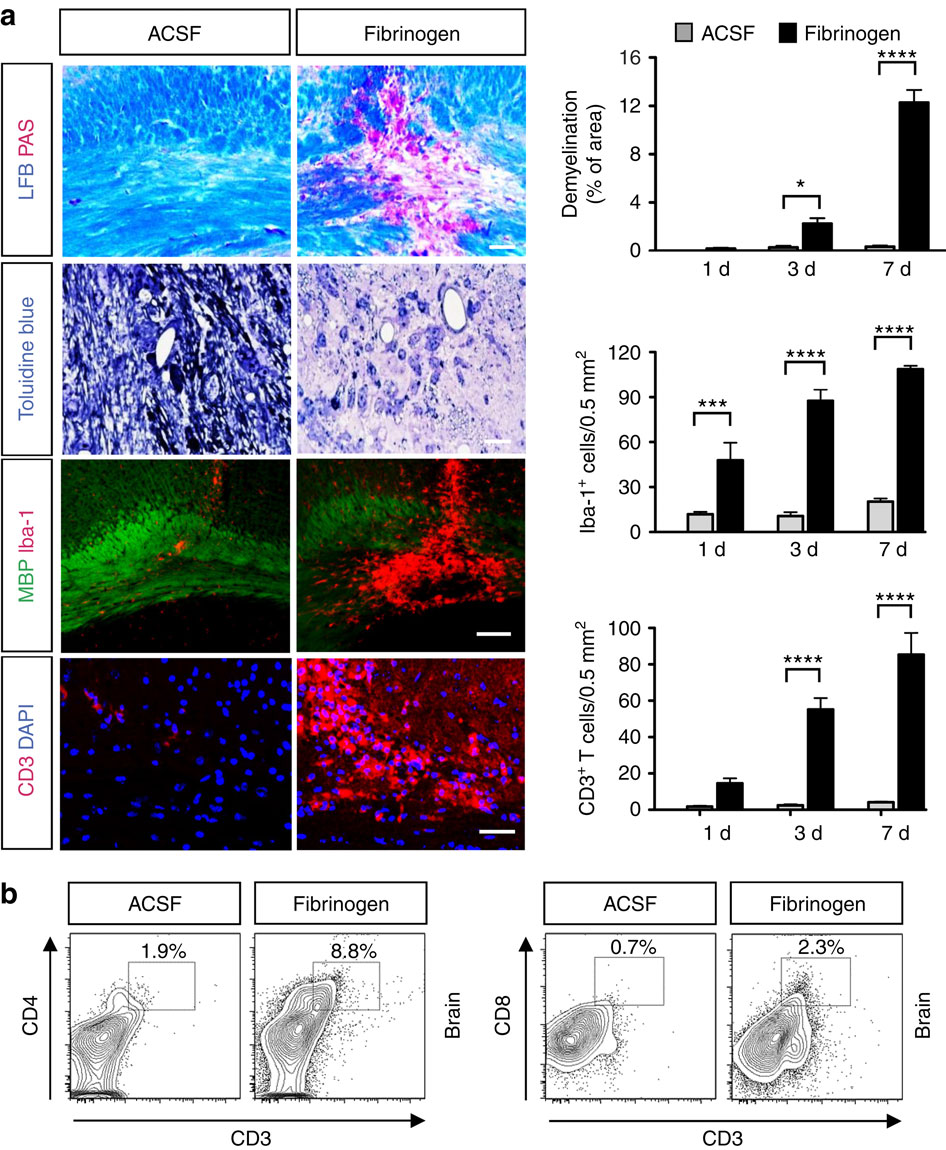当前位置:
X-MOL 学术
›
Nat. Commun.
›
论文详情
Our official English website, www.x-mol.net, welcomes your
feedback! (Note: you will need to create a separate account there.)
Blood coagulation protein fibrinogen promotes autoimmunity and demyelination via chemokine release and antigen presentation.
Nature Communications ( IF 14.7 ) Pub Date : 2015-Sep-10 , DOI: 10.1038/ncomms9164 Jae Kyu Ryu , Mark A. Petersen , Sara G. Murray , Kim M. Baeten , Anke Meyer-Franke , Justin P. Chan , Eirini Vagena , Catherine Bedard , Michael R. Machado , Pamela E. Rios Coronado , Thomas Prod'homme , Israel F. Charo , Hans Lassmann , Jay L. Degen , Scott S. Zamvil , Katerina Akassoglou
Nature Communications ( IF 14.7 ) Pub Date : 2015-Sep-10 , DOI: 10.1038/ncomms9164 Jae Kyu Ryu , Mark A. Petersen , Sara G. Murray , Kim M. Baeten , Anke Meyer-Franke , Justin P. Chan , Eirini Vagena , Catherine Bedard , Michael R. Machado , Pamela E. Rios Coronado , Thomas Prod'homme , Israel F. Charo , Hans Lassmann , Jay L. Degen , Scott S. Zamvil , Katerina Akassoglou

|
Autoimmunity and macrophage recruitment into the central nervous system (CNS) are critical determinants of neuroinflammatory diseases. However, the mechanisms that drive immunological responses targeted to the CNS remain largely unknown. Here we show that fibrinogen, a central blood coagulation protein deposited in the CNS after blood-brain barrier disruption, induces encephalitogenic adaptive immune responses and peripheral macrophage recruitment into the CNS leading to demyelination. Fibrinogen stimulates a unique transcriptional signature in CD11b(+) antigen-presenting cells inducing the recruitment and local CNS activation of myelin antigen-specific Th1 cells. Fibrinogen depletion reduces Th1 cells in the multiple sclerosis model, experimental autoimmune encephalomyelitis. Major histocompatibility complex (MHC) II-dependent antigen presentation, CXCL10- and CCL2-mediated recruitment of T cells and macrophages, respectively, are required for fibrinogen-induced encephalomyelitis. Inhibition of the fibrinogen receptor CD11b/CD18 protects from all immune and neuropathologic effects. Our results show that the final product of the coagulation cascade is a key determinant of CNS autoimmunity.
中文翻译:

凝血蛋白纤维蛋白原通过趋化因子释放和抗原呈递促进自身免疫和脱髓鞘作用。
自身免疫和巨噬细胞募集进入中枢神经系统(CNS)是神经炎性疾病的关键决定因素。但是,驱动针对中枢神经系统的免疫反应的机制仍然是未知的。在这里,我们显示纤维蛋白原,血脑屏障破坏后沉积在中枢神经系统中的中央凝血蛋白,诱导脑源性适应性免疫反应和外周巨噬细胞募集入中枢神经系统,导致脱髓鞘。纤维蛋白原刺激CD11b(+)抗原呈递细胞中的独特转录签名,诱导髓磷脂抗原特异性Th1细胞的募集和局部CNS活化。在多发性硬化症模型(实验性自身免疫性脑脊髓炎)中,纤维蛋白原的消耗减少了Th1细胞。纤维蛋白原诱导的脑脊髓炎分别需要主要的组织相容性复合物(MHC)II依赖性抗原呈递,CXCL10和CCL2介导的T细胞和巨噬细胞募集。抑制纤维蛋白原受体CD11b / CD18可免受所有免疫和神经病理学影响。我们的结果表明,凝血级联反应的最终产物是中枢神经系统自身免疫的关键决定因素。
更新日期:2015-09-13
中文翻译:

凝血蛋白纤维蛋白原通过趋化因子释放和抗原呈递促进自身免疫和脱髓鞘作用。
自身免疫和巨噬细胞募集进入中枢神经系统(CNS)是神经炎性疾病的关键决定因素。但是,驱动针对中枢神经系统的免疫反应的机制仍然是未知的。在这里,我们显示纤维蛋白原,血脑屏障破坏后沉积在中枢神经系统中的中央凝血蛋白,诱导脑源性适应性免疫反应和外周巨噬细胞募集入中枢神经系统,导致脱髓鞘。纤维蛋白原刺激CD11b(+)抗原呈递细胞中的独特转录签名,诱导髓磷脂抗原特异性Th1细胞的募集和局部CNS活化。在多发性硬化症模型(实验性自身免疫性脑脊髓炎)中,纤维蛋白原的消耗减少了Th1细胞。纤维蛋白原诱导的脑脊髓炎分别需要主要的组织相容性复合物(MHC)II依赖性抗原呈递,CXCL10和CCL2介导的T细胞和巨噬细胞募集。抑制纤维蛋白原受体CD11b / CD18可免受所有免疫和神经病理学影响。我们的结果表明,凝血级联反应的最终产物是中枢神经系统自身免疫的关键决定因素。































 京公网安备 11010802027423号
京公网安备 11010802027423号